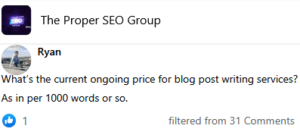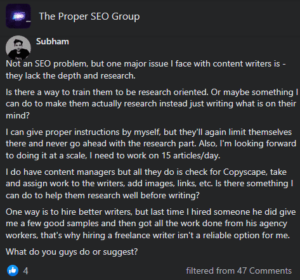u/deleted
Best Writer Or Writer That Resonates?
Recently, I came across with a comment from someone with a lengthy note about my writing style. In fact, he pinpointed the use of hyphens. He reviewed my article to that extent. He sent me a long comment about the grammatical errors in my blog post, which I do appreciate.
Yet, what struck me the most is when he said, "Your post should not be a conversation."
I said, "What?"
I disagree.
In this case, which one do you want to become? Become the best writer out there or become that writes content that resonates?
If I were to choose, I'd rather become someone that resonates.
You don't have to throw away the grammar rules when you write content on your websites. Of course, you have to know that "You is" should be "You are."
This isn't my point at all.
You may familiarize with thousands of grammar rules to produce an epic or killer content out there; yet, remember this, my friends, you aren't to impress. You're here to connect.
You create content because you have a message to say to your readers. That's the most important thing. This brings money, influence, and power. Being able to resonate with your readers is the key factor to success. Not grammar rules.
I remember Robert Kiyosaki mentioned this, "I want to be a bestselling author, not a best-writing author." That inspired me, especially I'm not someone from a country where English is only a secondary language.
I may be teaching you how to leverage your content, but that doesn't exclude myself from creating mistakes. I admit that I can't write a perfect, error-free piece of content. But that doesn't stop me from doing what I should do.
To dedicate myself to teach you how to write a piece of content that generates results. That's what I do. Be it traffic or conversions, whatever.
This is my message.
Aim to become someone that resonates. Strive to create content on your websites that connect with your readers regardless of the niche you belong. You may use the writing tools available right now just to ensure you won't annoy the grammar Nazis out there.
However, this shouldn't be the cause you to stop from doing what you love and to make money by writing something you want.
Generally, don't compromise your message simply because you're too conscious with a perfect content. Because, you know what, there's no such thing.
If you aim to write a scholarly article, it's best to compete with Wikipedia, etc. But not in this industry. Why? Your readers will see you as someone they praise, not someone they could build relationship and pay later on.
Have you ever seen someone leaving 100+ comments on scholarly sites? Not even Writer's Digest have that. But blogs? Jeff Goins' blog alone has 500+ comments.
My friends, we're building blogs. Not just websites. Blogs are personal. We aren't here to make thesis. We do research to leverage our content. But the tone of our writing remains the same.
Again, I'm not saying you shouldn't care about grammar. My point is, you don't have to be scholarly in writing your blog posts. Become a conversational writer.
Build relationship and connection with your audience, not just claps.
34 💬🗨
📰👈
Your voice depends on the blog topic and your audience.
If you're reviewing a product and I'm a first-time reader, you speaking about your use of the product is valuable, but possibly confusing if you mention too many personal details. I am not invested in your life, so your personal anecdotes had better be brief.
If you don't inject yourself into the article, I need some idea that you've personally evaluated the product. It doesn't have to be a conversational tone.
Where I expect to find a conversational tone is in a blog that is closer to a journal, where your personal journey is a big part of the blog topic. For example, you have a fitness blog chronically your weight loss, or whatnot.
we're building blogs. Not just websites. Blogs are personal.
That line is well-blurred. Most blogs today are just information websites — not personal. They're still called blogs only because the websites are powered by blogging software.
Do a Google search for just about anything and the first page search results will contain SEO-optimized blogs. The more obscure the search, the more blogs you'll see in the results. It's called 'targeting a niche.' Bloggers choose their blog topics by doing keyword research to find subjects they can easily rank for in the first page of Google results.
There's nothing personal about someone writing on a topic because he decided he could monetize the topic, not because the topic is his passion. Google is horribly broken at this point because its results are so easily manipulated.
That's another great point. I am glad you pointed this out. I appreciate it so much. :)
erichendel
In terms of when to take criticisms of grammar seriously, there are a couple of concepts from Linguistics that I think are actually really useful to keep in mind here. These are the notions of "prescriptive grammar" and "descriptive grammar," which kind of correspond to the issue you referenced of being a "good" writer, as opposed to being a writer who resonates with your readers.
Basically, a prescriptive grammarian is someone who patrols written and spoken language, and then attempts to dictate a set of universal rules for how that language should be used without regard to context or author intent. When someone tells you that your writing is "incorrect" because you used "who" when you should have used "whom," then this is almost always an example of prescriptive grammar.
Descriptive grammar on the other hand involves the opposite approach. A descriptive grammarian doesn't exactly try to change language (at least not always), but instead documents its use with the intent of understanding it's underlying structure. In contemporary linguistics, there are many people who work cataloging language rules in a descriptive context. When researchers travel to a rural location and document how the local variant of the language spoken in that place functions, this is an example of descriptive rather than prescriptive grammar.
Basically, rather than identifying differences in language use across regions as "errors" (as prescriptivists do) descriptivists seek to catalogue these differences so as to better understand how languages develop and respond to social forces.
I think that this distinction is useful for us to remember when writing, because core to the basic concept of descriptive grammar is the idea that all language is technically correct if it can communicate it's message. For instance, if you're a non-native speaker of English and you say to a friend "tomorrow I go to store," then while prescriptivists would say this sentence contains multiple errors, descriptivists would say that you've correctly used English's grammatical rules and structures due to how your sentence doesn't contain any noticeable ambiguities. That is, you correctly placed the adverb "tomorrow" before a present-future verb (go) to indicate a future act, and then indicated the target of that verb (store) by placing a noun at the end of the sentence which you then linked to the primary verb with the word "to." While it may be non-standard, the sentence itself is perfectly understandable.
Even if we are native speakers of English, I think it's useful for us to keep this prescriptive/descriptive distinction in mind when processing criticisms of our grammar. If someone points out that a sentence you've written is vague and difficult to read, or that it (worse) technically means something entirely different from what you'd intended, then this could be a valid descriptive criticism. Contrast this with a commenter saying that it's "unprofessional" to use "who" when you should have used "whom," or that use of a phrase like "y'all" hurts your credibility due to this phrase not being present in standard American English. These latter two examples would be pretty clear prescriptivist statements, and as a result could be safely ignored since they technically have no bearing on the quality of your writing.
Basically, I don't think being a good writer is an issue of writing in accordance with grammatical rules. Good writing is by definition writing which connects with its readers, and sometimes that writing may involve the use of non-standard phrases or colloquialisms. It's worth noting that across all of the world's languages and literatures, there have been amazingly talented authors who deliberately wrote in a conversational style. Mark Twain is a famous example, as is James Joyce. For that matter, standard English itself even has a few prescriptivist rules that can produce some comedically awful sentences if followed correctly. One example I know of is when Winston Churchill once responded to the claim that we should never split an infinitive by saying (humorously) "this is a rule up with which we should not put." Churchill's sentence is technically grammatically correct, but you'd be hard pressed to find anyone who said it was well written because of that fact. 🙂
Thanks for your comprehensive thought about my message shared today. I really appreciate it a lot as it gives me a new perspective about writing. What struck me the most is when you included the issue of non-native English speaker because I am.
Though the Philippines speak good English, the way we speak and arrange the words are different from those who are native speakers. This is because of the heavy influence from the Spanish language.
Again, thank you so much for your thoughts. I appreciate it so much. :)
PosRel
Grammar can become a non-issue with a pro version of grammarly. Although I do find it loves to add hyphens:)
I don't write anything without it. I am lucky enough to have a daughter who is an excellent copy editor. She takes a look after grammarly.
I don't know how anyone writes anything without it.
I tried Grammarly for most of my posts and tried the paid features to compare what the app does with my work when using only the free features. It does a lot, helps a lot for me, especially that I am not a native English-speaker. It helps in a way that I can improve more on my writing. ☺️
📰👈
How Worth and Word Count do You Pay a Website Content Writer Averagely?
I Want My Writers Are Rich In Research Before Writing







